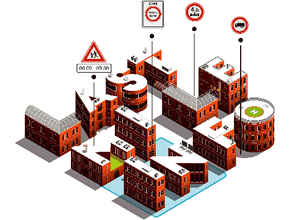Lastmile.info project
A temporary partnership between the parties Jumbo Supermarkets, Conundra, Municipality of Tilburg, Breda University of Applied Sciences (BUas) and Simacan started in 2022. With the aim of jointly looking for a solution to (digitally) unlock logistic last mile instructions and make them available to the entire sector. The project was successfully completed by this consortium by the end of 2023.
Developments made
The developments taken up and tested with this consortium includes the realisation of digital standards for the purpose of:
- Pre-planning (pre-trip) data enrichment and route preparation information for drivers;
- Override last mile routings during trip execution (on-trip) with last mile instructions (last mile guidance) for truck navigation systems.
Research into the optimal last mile
In addition to digital standards, several studies were conducted to gain a good understanding of the last mile issue:
The first study was conducted to gain insight into the last mile situation in the Dutch city of Tilburg. Here, the planned last mile routes of consortium partner Jumbo Supermarkets were compared with the preferred routes as desired by the municipality of Tilburg, and the actual realised routes. The results from this research formed the basis for a further dialogue on the value proposition and the possibilities for a data-driven (traffic) policy. After this, the research was further expanded, and in addition to logistic travel time and cost optimisation, aspects such as environmental impact were included. With the ultimate planning goal; a liveable city.
An important aspect in a liveable city is safety. Thus, vulnerable ‘objects’ such as schools and cycle paths were included and (if possible) avoided in the planned last mile routes. Because of the diverse interests of the different parties (municipalities, retailers, transporters and software companies), this resulted in situations where one last mile route was more favourable to one party and less favourable to another.
Lastmile.info website
To make information available to the public, a project website Lastmile.info had been set up. Here, (authorised) stakeholders could view, indicate or download lastmile instructions. There was also an opportunity to indicate ‘suggestions’ for both a location or shop owner as well as the municipality.
Interested parties could be kept informed of the latest developments regarding the project through this website. Due to the completion of the Lastmile.info project, this website has been discontinued.
Conclusion Lastmile.info project
The conclusion of the consortium is that the data-technical further development should be decentralised (federated) in order to maximise data quality. This conclusion is motivated by two important aspects. On the one hand, because a decentralised set-up provides more clarity on data ownership; the owner of the data is responsible for managing the overall data quality. On the other hand, involving different parties in the data management process increases confidence that data can be shared securely and reliably. This is the reason why, during this project, it has already been taken into account to set up access to last-mile information via the agreement system of the Basic Data Infrastructure (BDI).
Final result
In November 2023, the final results of this project were presented and explained at the ICT & Logistics Fair in Utrecht (NL).
Questions
If you have any questions about the Lastmile.info project, please contact René Bruijne.









